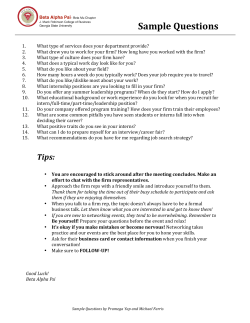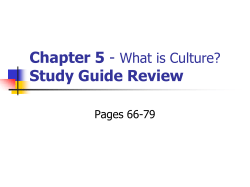
Problem Solving; Understanding and evaluating the many component skills, processes and beliefs.
Problem Solving; Understanding and evaluating the many component skills, processes and beliefs. Wendy Adams University of Colorado, Boulder Introduction Most important aspect of University science education – learn problem solving – Science educators – Employers & Alumni What do we know about how to actually teach problem solving? How can we measure it to know if our students are learning? How might we teach them better? Outline Problem Solving Knowledge, processes and beliefs Research in Problem Solving Physics, Psychology, Mathematics, Cognitive Science… New approach to measure problem solving Identification of nearly all specific components needed to solve any problem using a new instrument. (Embedded data design – physics not required) Comparison with results of a range of other problems (workplace to quantum mechanics). Problem Solving: “Problem solving is cognitive processing directed at achieving a goal when no solution method is obvious to the problem solver.” (Mayer, 1992) Definition based on the solver. Problem vs. Exercise Problem: “A problem arises when a living creature has a goal but does not know how this goal is to be reached. Whenever one cannot go from a given situation to the desired situation simply by action, then there has to be recourse to thinking. Such thinking has the task of devising some action, which may mediate between the existing and desired situations.” (Duncker, 1945) Problem Solving Component Skills, Processes and Beliefs Anything that can affect the subject’s ability to solve the problem. ‘Addition’ ‘Connects steps and Pieces’ ‘Creativity’ ‘Wants to succeed on “test”’ Types of Knowledge and Cognitive Processes Involved in Problem Solving Knowledge have Facts and concepts Strategic Procedural – Processes – do Beliefs, Expectations & Motivation Adapted from Mayer and Wittrock (2006). Representation/ Qualitative Analysis Planning/Monitoring & Assessing Executing Meta-processing Field of Problem Solving Research Intro Physics Birth Expertise Text book problem solving • Students • Experts Student performance on short, qualitative questions Student epistemology (beliefs) Timeline adapted from Sherin, 2007 Field of Problem Solving Research Birth • We don’t do much down here but other fields do some. Intro Physics Expertise • Experts are often studied solving problems trivial for them. Field of Problem Solving Research Birth Intro Physics Expertise As a result of limited studies…. • Attempts to teach problem solving is predominantly centered on teaching the correct problem solving strategy • Limited success If we can make them act like expert problem solvers – then they will be experts. Field of Problem Solving Research Birth Intro Physics Expertise Changing Knowledge Structures Beliefs, Expectations and Motivation Cognitive Processing Solving a problem requires some knowledge, even if it’s in the form of a general strategy for analyzing situations and attempting solutions. There have to be processes for operating on that knowledge to solve problems and answer questions. • “…a failing student would express dismay since s/he had understood the way to solve the problem perfectly when I explained it in class. I had to point out that the exam did not test their understanding of my solution, but their ability to generate their own solution. This mismatch in processing is a common and underappreciated influence on transfer.” Ross 2007 PERC conference Field of Problem Solving Research Birth Intro Physics Expertise Changing Knowledge Structures Beliefs, Expectations and Motivation Cognitive Processing Another outcome of limited studies… • Many researchers will say that problem solving skills do not transfer • Others speak of general skills Assumptions are a result of inadequate studies and analysis tools. Field of Problem Solving Research Birth Intro Physics Expertise Changing Knowledge Structures Beliefs, Expectations and Motivation Cognitive Processing Toward a grand theory - We should look more broadly • • • • Knowledge and processes throughout the life cycle Across a broader range of tasks Look to other fields Form and content at the “elemental” level Approach Develop a tool that identifies specific weaknesses in problem solving, in addition to strengths How can we find out more than, “Did they solve the problem or not?” A student could be expert like in many skills but one weakness can cause failure when solving a problem. For example: ‘Newton’s Laws’ How can physics - free measurements be made? Study a wide range of people, doing involved prolbems – specific modes of failure allow identification of specific components. Problem Solving Instrument • • • • • Base problem from the Jasper Woodbury Series* Story opens with Larry teaching Emily how to fly his ultra-light plane. Jasper tells Emily and Larry about camping trip at Boone’s Meadow 5 miles in. Jasper finds wounded Eagle Emily has complicated problem of planning best transportation considering route, payload, mileage and timing. The Solver is required to help Emily plan the rescue. *http://peabody.vanderbilt.edu/projects/funded/jasper/ Problem Solving Instrument Embedded data design - Free of discipline specific content. Engaging real world scenario. It is a “problem” regardless of your content expertise. Identifies a student’s skill set. Strengths as well as weaknesses in 44 specific areas used in all types of problem solving. Two scripted interns solve the problem while you solve the problem. (adds task of analyzing interns as well) Written instrument takes about 1 hour Sample 7. How confident are you about your answer? a. Positive b. Pretty sure c. Think it’s close d. Not sure at all Do you think that means we have to count the gas in the tanks as part of the payload or maybe it only counts extra fuel that you take along? Jasmine Sara considers this for awhile. That seems strange but he did say the payload includes fuel so I think we should count that. What does a full tank of gas weigh? How should I know? It held 5 gallons, does that help? Jasmine 8. Do you know what the gas weighs or how they could figure this out? Sara Development 30 students interviewed while completing the evaluation tool and 16 written responses collected. Identify strengths and weaknesses in problem solving Refine story and the questions Variety of subjects High school dropout, Elementary Ed. Majors, Nonscience majors, physics/engineering majors and professors. Development Does this tell us anything about how students solve science problems? …Physics in particular? Comparison Problems Instructor and/or employer evaluation compared to evaluation tool interview results. Comparison Problems Mechanics problem solving compared to evaluation tool written results with 5 students. Given height of the pyramid, dimensions of a block, horse power of a man, time allotted to build, How many men were required to build the Great Pyramid of Giza? University of Maryland Physics Education Research Group (2002). Activity-Based Physics (ABP) Alternative Homework Assignments. http://www.physics.umd.edu/perg/abp/aha/index.html Results • Written version of evaluation tool graded blind two months later • 3 point scale used for grading of rubric. All students easily identified and matched up. Results Jennifer 3 2.5 2 1.5 Writ t en Tool 1 0.5 0 1 2 3 4 5 6 7 8 9 10 11 12 13 14 15 16 17 18 19 2 21 2 2 2 2 2 2 2 2 3 31 Results Jennifer 3 2.5 2 Writ t en Tool 1.5 Pyramid 1 0.5 0 1 2 3 4 5 6 7 8 9 10 11 12 13 14 15 16 17 18 19 2 21 2 2 2 2 2 2 2 2 3 31 Results Skills scored by both # scores matched Female #1 Female #2 Female #3 19 17 12 19 16 11 18 16 17 12 (incomplete) Male #1 Male #2 Comparison Problems Quantum Mechanics problem solving compared to evaluation tool results of 5 students. Independent interviewer scored physics and Engineering students while solving a series of Quantum Mechanics’ problems. Suppose you are shooting photons at a screen one at a time and you see a dot appear on the screen as in the picture to the right. Where was that photon the instant before it hit the screen? Refined Rubric PhET.colorado.edu Results Guy 5 4 3 ET 2 1 0 1 2 3 4 5 6 7 8 9 10 11 12 13 14 15 16 17 18 19 20 21 22 23 24 25 26 27 28 29 30 31 Results Guy 5 4 3 ET QM 2 1 0 1 2 3 4 5 6 7 8 9 10 11 12 13 14 15 16 17 18 19 20 21 22 23 24 25 26 27 28 29 30 31 Results Female #1 Female #2 Male #1 Male #2 Male #3 Skills scored by both # scores matched 31 28 31 29 31 31 31 20 30 28 Results Students bring the same skill set to very different types of problem solving. Independently confirmed Skills used to solve trip planning scenario are the same as those used to solve: Quantum Mechanics Problems Mechanics Problem Empirical categorization of problem solving component skills, processes and beliefs. Problem Solving Evaluation Tool Addresses specific component skills needed to solve physics problems Avoids the typical pitfalls of students getting ‘stuck’ or ‘knowing’ the solution. Problem solving skills, process, beliefs Knowledge – have Beliefs, Expectations & Motivation Processes – do ▪ Math – basic add/sub/mult/div ▪ Confidence ▪ Acquires Info 1st time through ▪ Math – equation formation ▪ Attribution (takes responsibility) ▪ Plan ideas (What – ask questions) ▪ Reading comprehension ▪ Judgment of info based on the source ▪ Plan way to get answer (How) ▪ Spatial – mapping ▪ Wants to solve the problem for self ▪ Plan – big picture (Visualization) ▪ Previously known facts ▪ Wants to solve the ▪ Keep problem problem for interviewer framework in mind ▪ Real World knowledge ▪ Wants to succeed on the “test” ▪ Connect steps and pieces ▪ Knowledge of own Strengths ▪ Interested in the context of the problem ▪ Check calculations of others ▪ Knowledge of own Weaknesses ▪ Enjoyed solving the problem ▪ Aware of how others helped ▪ Enjoyed analyzing interns ▪ Meta-process – step outside of problem solving to see if own actions are useful. ▪ Number Sense Problem solving skills, process, beliefs Knowledge – have ▪ Estimation Beliefs, Expectations & Motivation ▪ Enjoyed complete experience ▪ Ability to analyze interns ▪ Real life vs. student ▪ Careful/Thorough Processes – do ▪ Skepticism ▪ Estimation ▪ Creativity ▪ Adaptability (shifts direction easily) ▪ Can throw out useless info ▪ Judgment of reasonable issues ▪ Judgment of importance of values (is it material) ▪ Tie in personal experiences ▪ Tie in info provided by another ▪ Scientific Process (each step based on evidence not by gut feeling) ▪ Remember previously noted facts ▪ Remember what s/he has calculated or reasoned. Example of Rubric Skepticism level 1 - Believes whatever is told to them. If the character says something different from what they’ve already figured out, will immediately question themselves and assume they must be wrong and the outside person correct. Will really struggle to find why the character is right and question self before anything written even from a made up intern in evaluation tool. 3 - Selective about what information they trust; however, base this decision on source or maybe reasonableness rather than content. 5 - Always checks new information based on its reasonableness as well as looking for another source to corroborate the information. Example Data Quantum Mechanics Interviewer: Problem Solving Interviewer: “she seemed to view learning [as] how to accept every weird thing we told her… she thought the first step was to accept things and the second step was to try to understand them. She always rethought her ideas when another student suggested something, although she maintained enough skepticism to recognize that other students were often wrong.” “Always had a knee jerk response which was not always good but then on her own she considers carefully and comes up with the right answer. …she’ll consider whatever is thrown out there, decisions are based on the most logical answer. If a suggestion does not make sense after careful consideration, she holds onto her beliefs. Very reliable” Skills in the classroom Typical homework problems require: • Knowledge of the content (Newton’s Laws, algebra, …) • Plan way to get answer (How) • Estimation • Remember what s/he has calculated or reasoned • Wants to solve the problem (for self, for grade, …) • Careful/Thorough • Confidence In groups: • Check calculations of others • Tie in info provided by another • Adaptability (shift direction easily) Skills in the classroom Show Stoppers: • Content Knowledge – (Newton’s Laws) • Wants to solve the problem (self, grade, …) • Attribution (takes responsibility for their actions) • Plan way to get answer Compensation: • Careful/Thorough helps compensate for weak content, planning, Remember what s/he has calculated or reasoned. • Meta-processing helps compensate for weak planning Skills in the classroom Not needed with typical homework problems: • Picking up information the first time through • Planning ideas (Creating questions) • Visualizing the problem • Remember previously noted facts • Keep problem framework in mind • Can throw out useless information • Judgment of reasonable issues • Creativity • Skepticism • Ties in personal experiences • Student vs. Real world Skills in the classroom Not needed with typical homework problems: • Picking up information the first time through – quite important in real life but almost never required in school. • Skepticism – Discouraged by the typical environment because it competes with another important lesson, do what your teacher tells you. • Visualize the Problem – Some problems do require this but are rare. Most are not involved enough to require visualization for solution. – Students are often told they should make a diagram; however, it is a meaningless exercise to them when this is unnecessary for finding a solution. Skills in the classroom Not needed with typical homework problems: • Planning ideas (Creating questions) – This is a debilitating weakness in any work environment that requires leadership or independent work; however, it is not required with most problems where the problem is clearly laid out. – Emphasis on group work also allows a person who has poor skills in this area to do well in school without ever using this skill. Skills in the classroom We teach … unknowingly • Ability to analyze interns – Translates to student analyzing the instructor. – Quite often learning all the material in a class is an insurmountable task; however, learning the material that is important to your instructor is not. – Once a student learns enough about the instructor to determine what to expect on the exams, their attention can be focused accordingly. – Similarly, an employee that has the ability to analyze his boss, customers and clients can be crucial. Conclusions Previous work studied a very limited population solving text-book type problems. I evaluated a wide range of people solving indepth problems. Strengths and weaknesses identified with this one trip planning scenario, are the same for each person in a wide range of tasks. (from workplace to quantum mechanics) Itemization of specific skills, beliefs and processes useful for thinking about how to teach problem solving.
© Copyright 2025





















